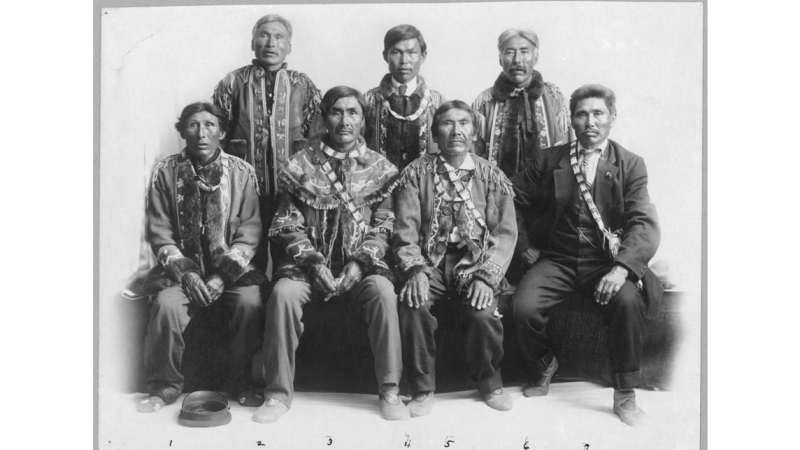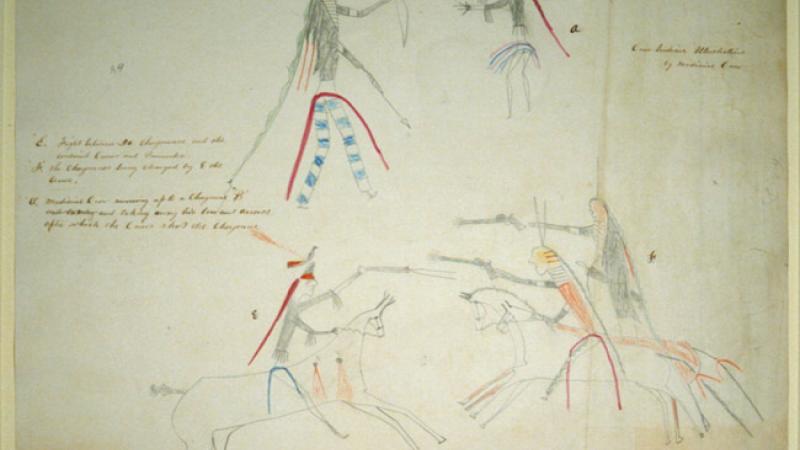Funding Opportunity for
Awards for Faculty at Tribal Colleges and Universities
Maximum award amount
Expected Output
Period of performance
The deadline for this cycle has passed. Updated guidelines will be posted in advance of the next deadline. In the meantime, please use these guidelines to get a sense of what is involved in assembling an application.
The Awards for Faculty at TCUs funding opportunity is cancelled for FY2026 and is not accepting applications.
The Awards for Faculty at TCUs program strengthens the humanities at Tribal Colleges and Universities (TCUs) by encouraging and expanding humanities research opportunities for individual faculty and staff members. Awards provide the individual recipient with time to write, conduct research, and pursue other project-related activities.
This program offers applicants flexibility in project outcomes and award periods. NEH welcomes proposals in all fields of the humanities, such as literature, history, philosophy, religion, and history, criticism and theory of the arts. Awards support individuals pursuing scholarly research that is of value to humanities scholars, students, and/or general audiences.
Eligible projects for all Awards for Faculty programs include:
- research in primary and secondary materials leading to the development of books, monographs, peer-reviewed articles, e-books, digital projects and resources, translations with annotations or a critical apparatus, critical editions, or other scholarly resources
- research related to institutional or community goals or interests, such as projects that draw on archival collections, collection and interpretation of oral histories, or the development of materials in support of culture or language preservation and revitalization
- research leading to the improvement of a single existing undergraduate course, including the development of humanities resources (for example, oral histories, identification and preparation of archival sources, or newly compiled historical or literary collections)
In addition, projects funded by the Awards for Faculty at TCUs program may include research that sustains and strengthens tribal languages and/or cultural traditions and supports students and the community, such as:
- research leading to the improvement of an existing graduate course
- research related to tribal or institutional interests, identities, and priorities, such as projects that draw on cultural or institutional archival collections
- the development of materials in support of sustaining, preserving, and revitalizing culture or language
- research and preparation leading to the development of a humanities workshop series for students at the affiliated institution and/or members of the local community. A humanities workshop series must be prepared and led by the awarded individual faculty or staff member and must engage participants with primary sources. Workshops should develop participants’ knowledge and skills with humanities research methodologies, such as the collecting of oral histories, Indigenous research methods, language or linguistic methods, and/or archival research. Applicants should address how many workshops they plan to develop, and around what theme or themes. (Projects must plan for at least three workshops as part of a series.)
- travel to and research in archival or cultural collections with significant holdings in the applicant’s area of expertise or in an area of tribal or institutional priority or interest
The Awards for Faculty at TCUs program is open to individual faculty and staff members, including full-time, part-time, adjunct, and retired faculty and staff at TCUs. If retired, applicants must not be affiliated with or employed by another institution at the time of application. Awards support individuals who work between half time and full time on their projects. Projects may be at any stage of development. You may propose to complete your project by the end of the period of performance or you may propose to do so by a later date.
If you are awarded an Awards for Faculty at HBCUs or TCUs fellowship, your institution may be eligible to apply for funding to offset costs associated with your research leave, including funds to offset costs associated with hiring replacement instructors for humanities courses that the Awards for Faculty fellow would normally teach. Please visit Awards for Faculty Institutional Support – HBCUs and TCUs (neh.gov) for full details about this new program.
Note: NEH has moved to a shared payment service operated by the U.S. Department of the Treasury and can no longer deposit funds for awards to individuals into an institutional bank account. Starting with awards issued August 2024, NEH will make payment to a personal bank account only.
What’s new for 2025:
- The Notice of Funding Opportunity (NOFO) has been combined this year to include three programs (Awards for Faculty at HBCUs, Awards for Faculty at HSIs, and Awards for Faculty at TCUs). Please read the NOFO carefully and follow the guidance for the program to which you are applying.
- Applicants at TCUs are eligible for additional project types, as specified in the NOFO. In particular, please see the newly described “Humanities Workshop Series,” as well as the recommended attachment 6.
- Section D2, “Content and Form of the Application Submission,” has been updated to include additional attachments in 2025, and previously required attachments have in some cases been reordered. Please see, in particular, attachments 6 through 9, which previously were combined in a single attachment. Read carefully and follow the requirements.
- The application component table more clearly indicates which attachments are required, recommended, or conditionally required.
- If you are proposing a digital project, please see the new strongly recommended attachment 9 (“Data sample and data management and sharing plan”).
- Program staff will only review draft narratives and work plans submitted by applicants affiliated with eligible institutions that are not classified by the Carnegie Classification system as “Doctoral Universities: Very High Research Activity.” Please see the Notice of Funding Opportunity (Section D.4) for additional information.
- Funding restrictions regarding the preparation or revision of textbooks have been modified.
- Learn about NEH's implementation of recent Executive Orders.
Recorded Webinar
Optional Draft Narrative and Work Plan review: If you are at an eligible institution, submit your narrative and work plan to the @email email box by 11:59 Eastern on February 14, 2025 to receive feedback from NEH staff. Follow the guidance in the NOFO, Section D.
Live Q&A: The Live Q&A has been postponed. Check back here for updates.
Examples of Projects Funded by this Grant Program
Next
Application Instructions
Read the Notice of Funding Opportunity to ensure you understand all the expectations and restrictions for projects delivered under this program and that you are prepared to write the most effective application.
Application Materials
Notice of Funding Opportunity 2025 (PDF)
Grants.gov application package
Program Resources
Frequently Asked Questions, 2025 (PDF)
Policy on the Use of Artificial Intelligence for NEH Grant Proposals
Sample Application Narratives
The narrative samples below are not intended to serve as models, but to give you a sense of how a successful application might be crafted. Note that the format has changed since these applications were submitted. Follow the guidelines in the currently posted Notice of Funding Opportunity to insure that your application is complete and eligible.
Scholarly Resources Projects and Community or Institutional Goals or Interests Projects
Sample Application: The Last Treaty: The Middle Eastern Front and the End of the First World War
Sample Application: A Study of Diné (Navajo) Traditional Sheep Butchering
Sample Application: Women Writers and the Portrayal of Women in British Indian Fiction
Sample Application: Women of Leech Lake Nation: Historical Trauma and Colonization
Sample Application: Moroccan Director Moumen Smihi (b.1945): Arab Modernities and Cinema
Sample Application: Andean Cosmopolitans: Indigenous Journeys to the Habsburg Royal Court
Sample Application, The Abolitionist Movement's Involvement in American Politics, 1750-1865
Sample Application, The Discourse of Sovereignty in American Indian Print Culture
Sample Application, A History of Prison Architecture and Punishment in Colonial Senegal
Sample Application, The Mind of Eighteenth-Century British Writer Charlotte Lennox
Sample Application, Northern Cheyenne Ledger-Art Notebooks
Course Revision Projects
Sample Application, Pre-Columbian Art of the Western and Northern Frontiers of Mesoamerica
When you are ready to apply, register for a Grants.gov account. If you already have registered, make sure the account is current. After registering, you must add an “individual applicant” profile. Click on the “My Account” link, then on “Manage Profiles” and “Add Profile.” Refer to Grants.gov’s instructions for adding a profile.
Follow the instructions outlined in the Notice of Funding Opportunity and Grants.gov.
You will receive a confirmation from Grants.gov when you’ve successfully submitted your application. Subsequently, you will receive up to five more notices confirming different stages in the application process. Verify that you have received all confirmations. Note that email filters may send these messages to your spam or junk folder.
NEH will request letters of reference from your recommenders approximately seven to ten days after the application deadline. You will be notified by email when each of your letters of reference has been received. Once you receive final confirmation of receipt from Grants.gov, you may check the status of your letters by logging in to the secure area of NEH’s website. Enter your NEH application number and your Grants.gov tracking number. You will be able to see the names and e-mail addresses of your letter writers and whether their letters have arrived. If necessary, you may send reminders to your letter writers (including the upload link) from this site. You are responsible for ensuring that your letter writers have received the solicitations from NEH and submitted their letters.

